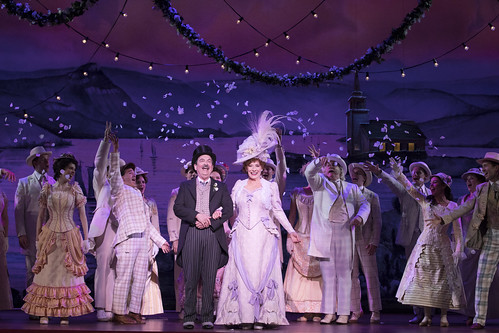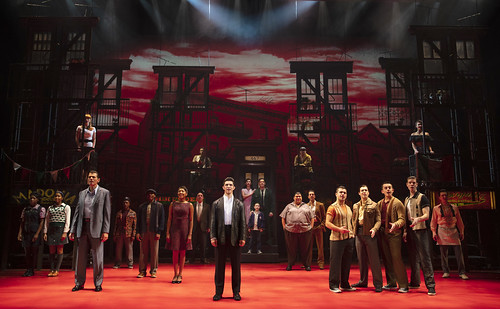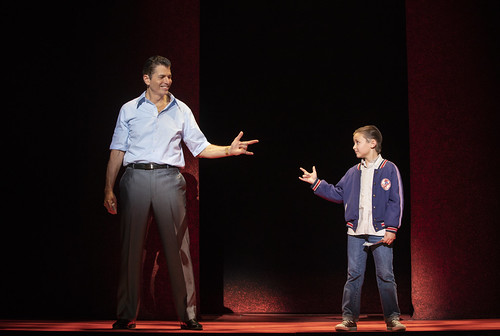
Betty Buckley won a Tony Award singing “Memory” in Cats but is probably best known as the tenderhearted stepmother on the TV show “Eight Is Enough.” Buckley returns to the musical theater stage as Dolly Gallagher Levi in the national tour of Hello, Dolly! running through March 17 at the SHN Golden Gate Theatre. Below: Buckley as Dolly and Lewis J. Stadlen as Horace Vandergelder with the company. Photos by Julieta Cervantes
I didn’t always get Hello, Dolly! partly because I didn’t think there was anything to get. I just thought I didn’t like it much. Sure, the Jerry Herman score is irresistibly cheerful, but I was always resistant to the Carol Channing clown show that so defined the musical from its inception in 1964 through Channing’s last tour in the mid-‘90s.
I saw the late Channing in her final tour and enjoyed her verve and comic skill, but the show was like an archival print you appreciate for its historical value more than it was a vital piece of musical theater. Then I saw the 2017 Broadway revival starring Bette Midler directed by Jerry Zaks. That bright, ebullient production was a whole different experience. The joy factor was enormous, the performances were warm and funny and Herman’s score was sheer delight from beginning to end. I’ve never experienced an audience so enraptured with a show that their collective adulation became a character in the show. It’s like the entire audience was enraptured and subjected to repeated fits of ecstasy. There was weeping and cheering and cheering on top of cheering.
That production reminded me that this musical has its roots in Thornton Wilder’s The Matchmaker, his second attempt at adapting a European play for American audiences. The first, 1938’s The Merchant of Yonkers flopped, but he revisited the play in 1955 as The Matchmaker, which was a hit and later served as the basis for Michael Stewart’s book for Hello, Dolly!. All those wonderful Wilder qualities – reminding us to live not merely inhabit our lives, to connect with other people, to trust more and worry less – were bursting out of the musical, which in itself provided a reason to revel in the present moment.
The Broadway revival has spawned a national tour with the marvelous Betty Buckley as Dolly, and while the erstwhile star of Cats, The Mystery of Edwin Drood and Sunset Boulevard may not be the first person you think of when you think of musical comedy, she attacks the material as a serious actor and delivers a deeply felt performance full of life and love.
The production, now at the SHN Golden Gate Theatre, retains the colorful zest of the Broadway production, from the cheerfully old-fashioned sets and Easter egg-colored costumes by Santo Loquasto to the choreography by Warren Carlyle (inspired by the original staging by Gower Champion) that embodies the ideal combination of charm, athleticism and beauty in musical theater dance.
Buckley’s Dolly Gallagher Levi has to make us care about her in several ways. We have to empathize with her grief. She has, after all, spent the last decade mourning the loss of her great love, her husband Ephraim Levi. And we have to give ourselves over to the philosophy she has adopted for herself, which is that everything will work out just fine. She may seem a little kooky or daffy in her meddling and the way she posits herself as an expert at everything, but she does all of that wisely. She simply trusts that good intentions and allowing for the best in people will yield the best possible result. Buckley succeeds beautifully on both counts. She’s warm and funny and, in her monologues to her husband (taken right from Wilder), quite affecting. As a singer, Buckley is having fun with the Herman score. She can deliver the comic goods (“So Long Dearie”) and the belt (“Before the Parade Passes By”) in equal measure, all the while making it entirely her own.
Of course Dolly is the fulcrum of the farce, but surrounding her is a delicious assortment of comic performances. Lewis J. Stadlen is appropriately gruff as Yonkers unmarried half-a-millionaire Horace Vandergelder, but he’s also just sweet enough to make you want him to end up with the scheming Dolly (she wants him for his money so she can spread it around). His is a classic style of musical theater comedy, and it works perfectly here. His chemistry with Buckley delights, especially in their turkey-beet-giblet dinner scene at the Harmonia Gardens.
As Vandergelder’s employees, Nic Rouleau and Jess LeProtto playing Cornelius and Barnaby respectively find that nice balance – as so much in this production does – of comedy and humanity so that when their big day in New York yields true love for both, we’re giddy right along with them. Rouleau has a spectacular voice, and LeProtto is a deft physical comedian. As Irene and Minnie, the women who conquer the hearts of the Yonkers clerks, Analisa Leaming and Kristen Hahn have gorgeous voices and admirable comic chops. Like Barnaby and Cornelius, they are breaking out of their usual roles and diving into adventure with gusto.
The lavishness of the production, the energy of the choreography and the sweetness of the story all combine perfectly in Act 2 as Dolly prepares, in her words, to rejoin the human race, and makes her grand entrance at the top of the stairs at the Harmonia Gardens. The waiters have preceded her entrance with a dazzling “gallop,” and Zaks’ and Carlyle’s staging of the title song reveals one delight after another as Buckley sets out, or so it seems, to charm the entire planet.
There’s a refrain running through Hello, Dolly! that the world is full of wonderful things. This heartfelt, buoyant production – a vivid reminder of why it’s so beloved – is most certainly one of them.
[bonus interview]
I interviewed Betty Buckley for a story in the San Francisco Chronicle. You can read the story here. Several paragraphs didn’t make the final edit and are included below:
The revival, Buckley says, feels connected to the original source material, Thornton Wilder’s “The Matchmaker” (which is actually a re-write of his earlier play, “The Merchant of Yonkers”).
“I am a Wilder devotee,” Buckley says. “In college, I played Mrs. Antrobus in his ‘The Skin of Our Teeth.’ There I was this budding feminist, a charter subscriber to Ms. Magazine, and I was thrilled to have words for all these feelings I had growing up about the hypocrisy I saw around me, the inequity between men and women. And the reaction to these Wilder monologues I was speaking as this character were just visceral and emotional. It was such an enlightening experience for me. I will be forever grateful to Thornton Wilder.”
Many of Dolly’s monologues in the musical, Buckley points out, are pulled directly from Wilder’s play. “Here’s this beautiful, joyous musical, but within it is a message about the truth vs. the cultural notion of patriarchy and people who are focused on money and hardness learning more about their humanity and human connection,” Buckley says. “Dolly is a sage widow who has been retired, making a living catch as catch can, and she has intuitive gifts about life, love and connections. She decides to come back to life after 10 years of grieving, and she helps people remember where their hearts are. This story is so resonant and timely.”
FOR MORE INFORMATION
Hello, Dolly! continues through March 17 at the SHN Golden Gate Theatre, 1 Taylor St., San Francisco. Tickets are $56-$256. Call 888-746-1799 or visit www.shnsf.com




 First mounted off-Broadway in 1989, the show didn’t become a movie until 1993. Palminteri wrote the screenplay, and Robert DeNiro made his astonishingly assured directorial debut. Before heading out on national tour, Palminteri revived the show on Broadway last year under the direction of Jerry Zaks.
First mounted off-Broadway in 1989, the show didn’t become a movie until 1993. Palminteri wrote the screenplay, and Robert DeNiro made his astonishingly assured directorial debut. Before heading out on national tour, Palminteri revived the show on Broadway last year under the direction of Jerry Zaks.